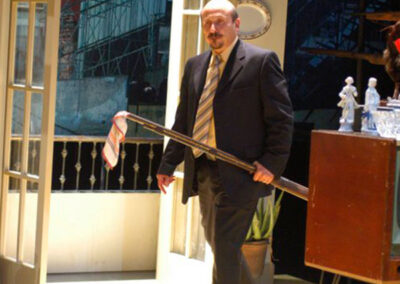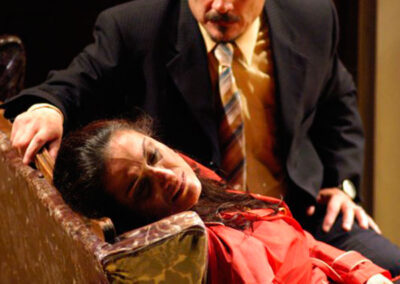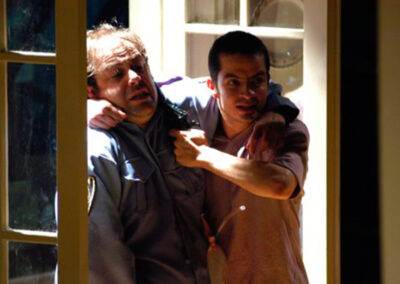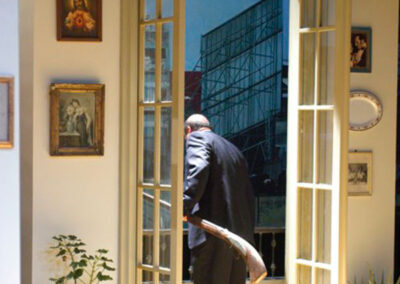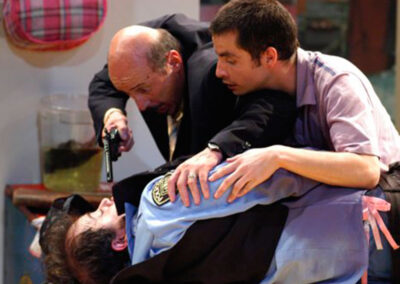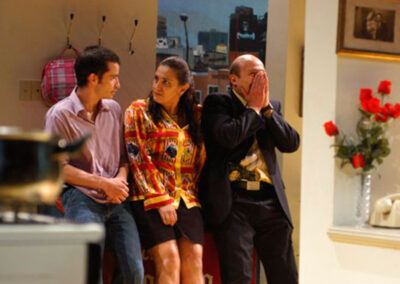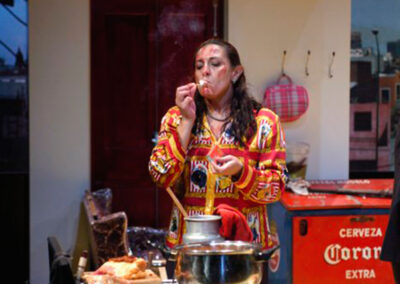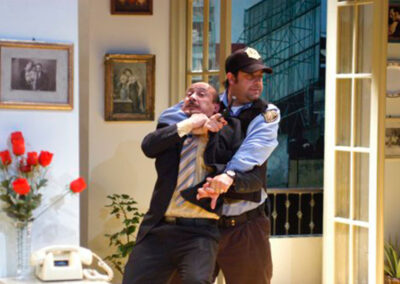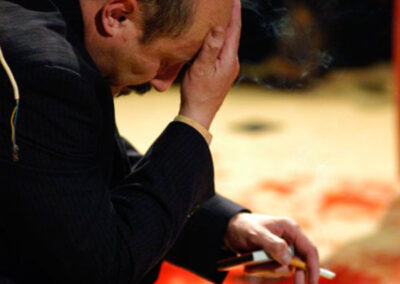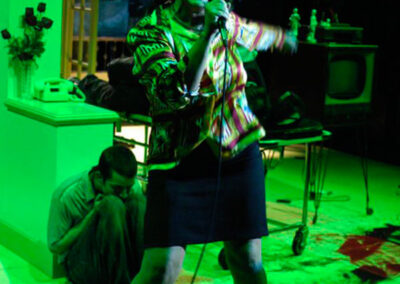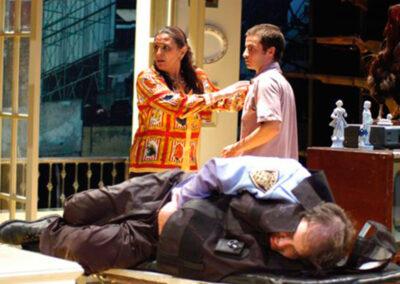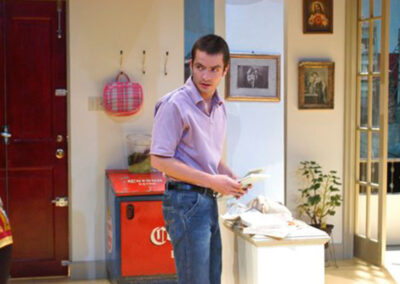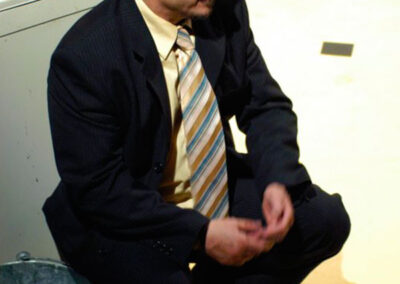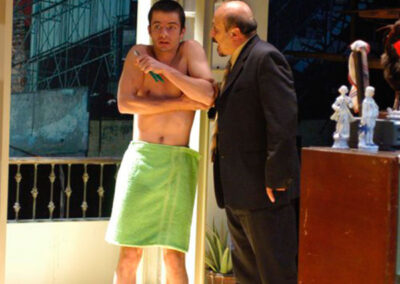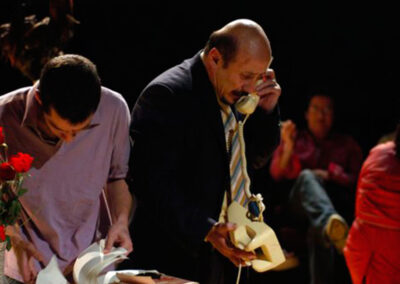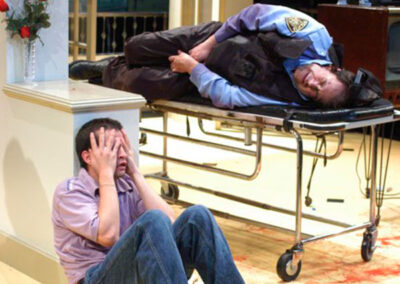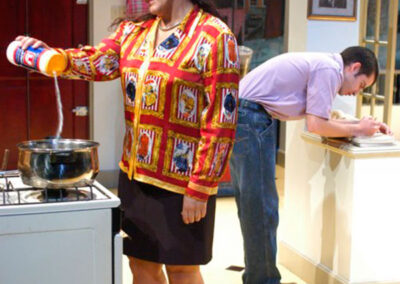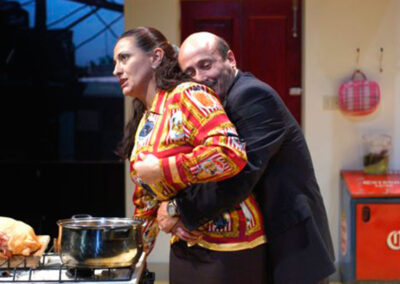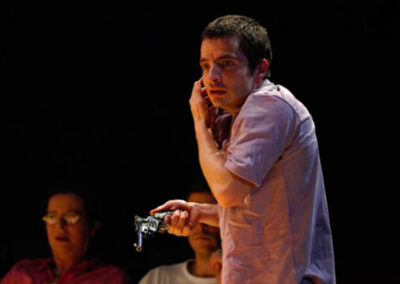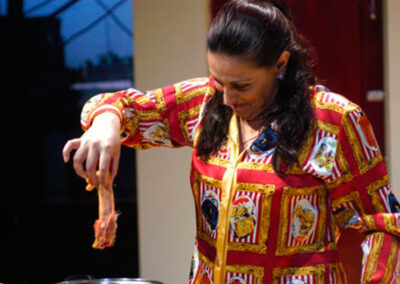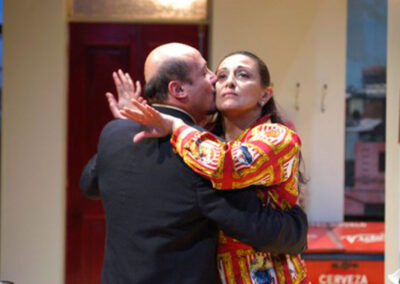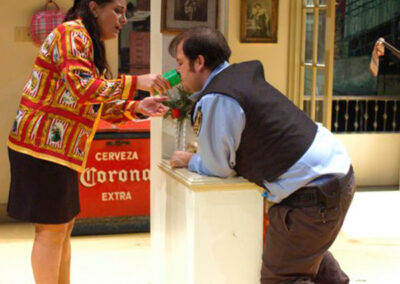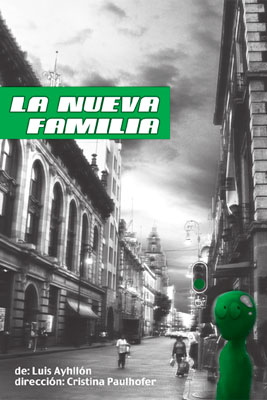
The Double Bed for “The New Family”
By: Luis Ayhllón.
Direction: Christina Paulhofer Carabella.
Cast:
Nora – Cristina Michaus
Neto – José Carlos Rodríguez
Make – Juan Carlos Vives
Luis – Juan Carlos Olivas
Voice-over Cast:
Loudspeaker: Suzana Garfel.
Sarita la de la SEP: Lilia Mendoza.
Patrol officer 2: Marco Antonio Aguirre.
Patrol officer 1: Luis Fernando Rojas.
Soldier: Raúl Adalid.
Young Person: Diego Alejandro Morales Cabrera.
Abril: Marcela Burgos.
Roberto: Ricardo Cortés.
Special Collaboration:
Anna Elia García, Diego Alejandro Morales, David Ponce.
Set Design and Lighting: Sergio Villegas.
Costume Design: Bertha Romero.
Music and Sound Design: Ricardo Cortés
Stage Combat: Miguel Ángel Barrera
Assistant Directors: Javier Salas and Marcela Burgos
Set Design Assistants: Mariana Sánchez and Germán Cárdenas
Photo Mural: Ma. Fernanda Sánchez Paredes
Visual Design: Leonor Hernández
Set Construction: Macedonio Cervantes
Costume Production: Vesarte
Scenic Painting: Paso de Gato
The double bed is a failed invention, disproportionate in every sense. For lovers, a single bed suffices. For those who sleep together out of habit, a king-size is more appropriate. And for those with principles, a bunk bed will do. The double bed is the stage where one snores, obese, while the other curls up in a corner. When families cease to exist in the form we know them, it will be one of the things we’ll be glad to have lost. But until that moment arrives: What should the double bed look like for the new family?
For those interested in solving this dilemma, The New Family by Luis Ayhllón may shed some light. Upon its release, it was written of the play:
“The best thing about the text is its instinct—not just dramatic, but the kind that transmits, with extreme purity (without the timid clumsiness demanded by the dramaturgical ideals of its time), the desire, pleasure, and delight in the violence inherent to the Mexican spirit: its dark humor, its corrosiveness, its landscape of water tanks and TV antennas, national emblems of our blind faith in the next crisis and in dreams. Ayhllón also confronts the irresponsible void where playwrights forget their monstrous mother: Mexico City—and more importantly, the cancerous cells that consume her: her inhabitants. La nueva familia stands out in the common theater of genre, manners, and small talent, where authors shine more in the style of spectacle TV—with loud declarations and pride—than through the power of their work.”
I cite The New Family because in another reference by a different author, the image of the double bed appears again:
“The living-dining area and the mattress are the coagulating zones of families. Theater is the coagulating zone of the collective. Ayhllón merges both zones in a play where two types of blood dissolve into nothingness. One, from a policeman mixed with his urine—not even expelled from an organ, but from the plastic bag of his dialysis, of course spilled on stage. The other, from a youth who lost it in her first encounter with the concrete of love, spilled offstage. Both types of blood counterbalance each other, but both, as always, become objects of mockery, pity, and scorn. In our world, in our nation, spilled blood has ceased to be ritual or patriotic act; it’s just spectacle, a shot of ratings, a shameful accident, something that only happens to fools—a common cosmetic for politicians.”
If in thrillers, pillows are used to suffocate victims, then in Ayhllón’s world—suffocating by proximity—the mattress (a double one, naturally) is the only thing sturdy enough to smother the new family, the one required to perpetuate the scatological dominance of the species.
Taking Ayhllón’s brilliant work as reference and returning to our theme, the conclusion is simple:
The double bed for the new family should resemble a sleeping bag—able to seal from the inside, insulated, and equipped with an integrated pistol—available in versions for singles, cohabitants, and married couples.
Don’t forget: the enemy bears your last name, and while you sleep, the most dissatisfied among them will be dreaming nightmares inside you.
ALBERTO VILLARREAL DÍAZ

